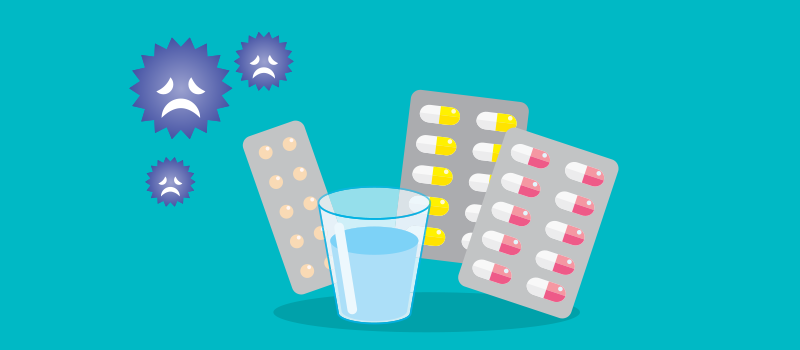What’s the Buzz
The Bee Healthy Blog
Do I Need Antimalarial Drugs For Traveling Overseas?

Every year, millions of Americans travel abroad, often to countries with an increased risk of diseases that do not commonly occur in the US. One such disease is malaria. Approximately 2,000 cases of malaria are diagnosed in the United States each year, mostly in travelers returning from parts of the world where malaria is common. Malaria prophylaxis (prevention) with antimalarial drugs can help to reduce the risk of infection.
The following pre-travel health advice will help you reduce your risk of contracting malaria. We will talk about the different antimalarial drugs available, as well as ways to avoid mosquito bites.
What is malaria?
Malaria is a parasitic disease. The malaria parasite spreads to humans through the bite of an infected mosquito. People who get malaria fall very sick with flu-like symptoms.
Symptoms of malaria typically include high fevers, shaking, chills, headache, nausea, vomiting, diarrhea, stomach pain, joint pain, fatigue, fast heartbeat, and fast breathing. A severe form of malaria can lead to organ dysfunction and may result in death.
Malaria is not common in developed countries with a temperate climate, such as the US. However, the disease is still prevalent in tropical and subtropical regions of the world. Nearly 300 million people worldwide get malaria each year. The disease claims 400,000 lives annually.
Are malaria pills required?
Malaria pills are required if you are traveling to countries with a high risk of contracting malaria.
If you are traveling to a low malaria risk area, antimalarial tablets are only recommended if you have an increased risk of catching malaria or having severe disease.
You should visit your primary care provider or local travel clinic for a risk assessment at least 6 weeks before traveling abroad. Your healthcare provider can recommend prophylaxis with an antimalarial drug and other protective measures such as a yellow fever vaccine if required.
Where is malaria risk greatest?
The greatest risk for contracting malaria is living in or visiting areas where the disease is common. According to the World Health Organization (WHO), this includes:
- Sub-Saharan Africa
- South Asia and Southeast Asia
- Central America and Northern South America
- Pacific Islands
Keep in mind that the risk can change depending on seasonal changes and local malaria control measures.
The Centers for Disease Control and Prevention (CDC) website provides up-to-date information on recommended malaria prophylaxis for every country in the world.
Who is at risk of severe malaria?
Some people are at increased risk of severe disease and need to take extra precautions to prevent malaria. This includes older adults, infants and young children, pregnant women and their unborn babies, travelers coming from areas where there is no malaria, people with a weakened immune system, and people who don’t have a spleen.
Additionally, a type of malaria called falciparum malaria is prevalent in some countries and is known to cause severe illness.
It is also worth noting that the malaria parasite has developed drug resistance in some parts of the world, which can make the infection harder to treat. Also, remember that you may not have access to immediate medical attention from health care providers in rural areas in some developing countries.
What are the different types of pills for malaria prevention?
The malarial parasite develops in the liver and then infects the red blood cells. Most antimalarial drugs kill the parasite when it is in the red blood cells.
Here are the commonly available drugs for malaria chemoprophylaxis (malaria prevention with medications).
Chloroquine
Availability: Over-the-counter
Dosage: Weekly dose
Side effects: Nausea, ocular disorders
Proguanil
Availability: Over-the-counter
Dosage: Daily dose
Side effects: Gastrointestinal symptoms
Mefloquine
Availability: Prescription only
Dosage: Weekly dose
Side effects: Neuropsychiatric symptoms
Doxycycline
Availability: Prescription only
Dosage: Daily dose
Side effects: Vaginal yeast infections, sun sensitivity
Malarone (atovaquone and proguanil)
Availability: Prescription only
Dosage: Daily dose
Side effects: Gastrointestinal symptoms, rash
Primaquine
Availability: Prescription only (this medication is effective against vivax malaria)
Dosage: Daily dose
Side effects: Gastrointestinal symptoms, not suitable for people with G6PD deficiency
Which antimalarial medication is right for me?
Your healthcare provider or travel health expert will help you decide which antimalarial medication is right for you. It will depend on the part of the world you’re visiting, the length of your trip, cost factors, and your medical history.
As mentioned, the malaria parasite has developed drug resistance to common antimalarial drugs like chloroquine in many regions. This drug, therefore, has limited efficacy in preventing malaria in those areas.
Some antimalarial drugs can be started shortly before traveling abroad. These medicines must be taken as a daily dose. They are therefore ideal for last-minute travel and short trips.
Your doctor will talk to you about the convenience of taking an antimalarial medication once a week versus daily. Cost may be another factor in the choice of antimalarial drugs. Some antimalarial drugs like chloroquine and proguanil are relatively cheap, while others like Malarone can be expensive.
A malaria vaccine is available. At the current time, this vaccine is recommended for children who live in countries where there is a higher risk of malaria.
How long do you have to take anti-malaria tablets before traveling?
Here are some general guidelines on how long to take anti-malaria pills when traveling abroad.
Chloroquine: Start the medication 1-2 weeks before travel, take it weekly on the same day of the week during travel, and continue taking it for 4 weeks after leaving the risk area.
Mefloquine: Start 2 weeks before travel, take once a week on the same day of the week, and continue for 4 weeks after leaving the malaria risk area.
Doxycycline: Start 1-2 days before travel, take daily at around the same time every day, and continue taking daily for 4 weeks after leaving the malaria area.
Malarone (atovaquone-proguanil): Start 1-2 days before travel, take daily at around the same time, and continue taking for 7 days after leaving the malaria area.
Primaquine: Start 1-2 days before travel, take daily at around the same time every day, and continue taking the antimalarial drug for 7 days after leaving the malaria risk area.
You should consult a tropical medicine expert at a travel clinic several weeks before any planned international travel. You need to start taking the antimalarial medicine before travel so that there is enough drug in your body for malaria prevention. You also need to continue taking the medicine after leaving the risk areas so that any parasite that may already be in your body will not cause malaria symptoms. It is important to take the malaria prevention medication regularly because missing doses can lead to developing malaria infection.
Which antimalarial should be given 1-2 days before travel?
Three antimalarials—doxycycline, Malarone (atovaquone-proguanil), and primaquine can be begun 1-2 days before travel. These drugs must be taken as a daily dose. They are therefore ideal for last-minute travel and short trips.
Which antimalarial should you take daily during travel and daily for 1 week after travel?
Malarone (atovaquone-proguanil) and primaquine are antimalarial drugs to be taken daily during travel and daily for 1 week after travel.
How can I prevent mosquito bites?
Measures for bite prevention are important for everyone traveling to places with malaria transmission. This is because antimalarial medicine is not 100% effective. Also, antimalarial drugs do not prevent malaria parasites from entering the body. They only prevent the symptoms of malaria from developing.
Here are some tips to prevent malaria by preventing mosquito bites:
- Remain in urban areas and well-screened, air-conditioned accommodations as much as possible
- Use mosquito nets, especially when sleeping in the open air
- Use insecticides with the correct levels of DEET
- Cover as much skin as possible
- Apply permethrin to clothes and mosquito nets
- Use insect repellent in living areas
Wrapping up
Malaria is a serious infection that can lead to severe complications and even death. You should go in for a consultation with your primary care physician at least 6 weeks before traveling abroad to allow time for immunizations and boosters, such as yellow fever vaccination and antimalarial medication. This will also give your healthcare provider time to assess any adverse reactions. Be sure to tell your provider about all the places you plan to visit, the time of year for your planned trip, the purpose of your visit, and the duration of your stay.
References:











SOCIAL